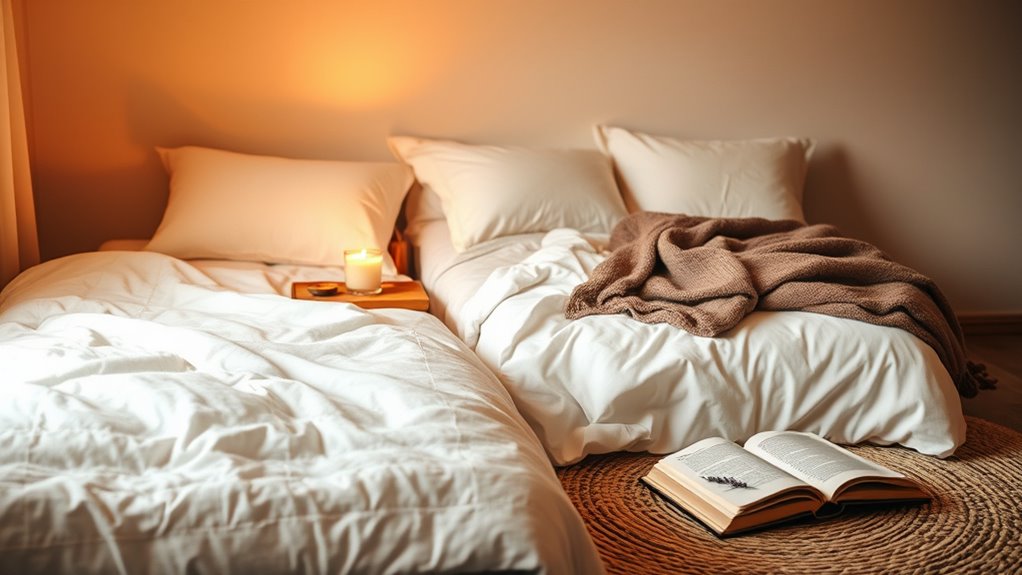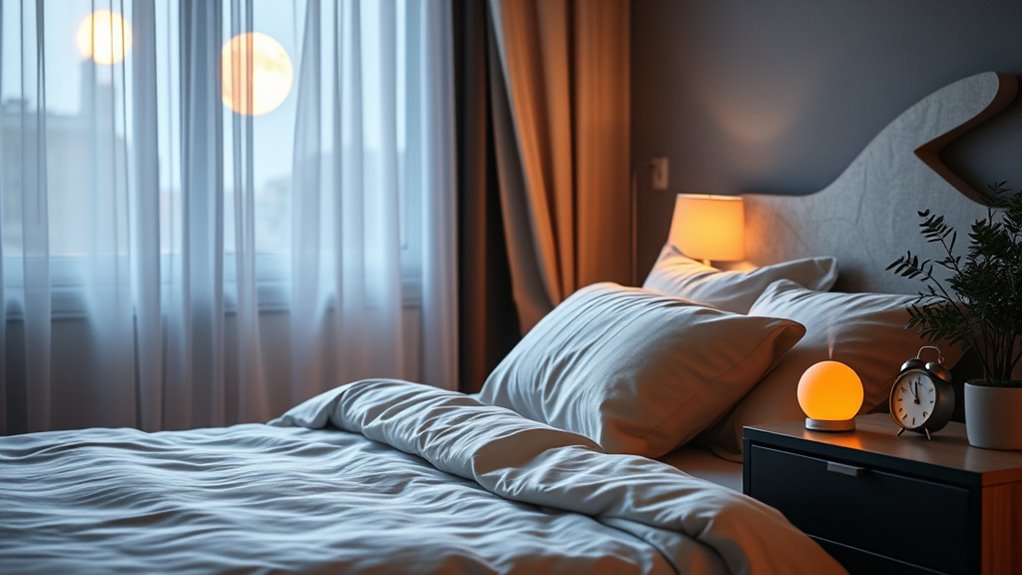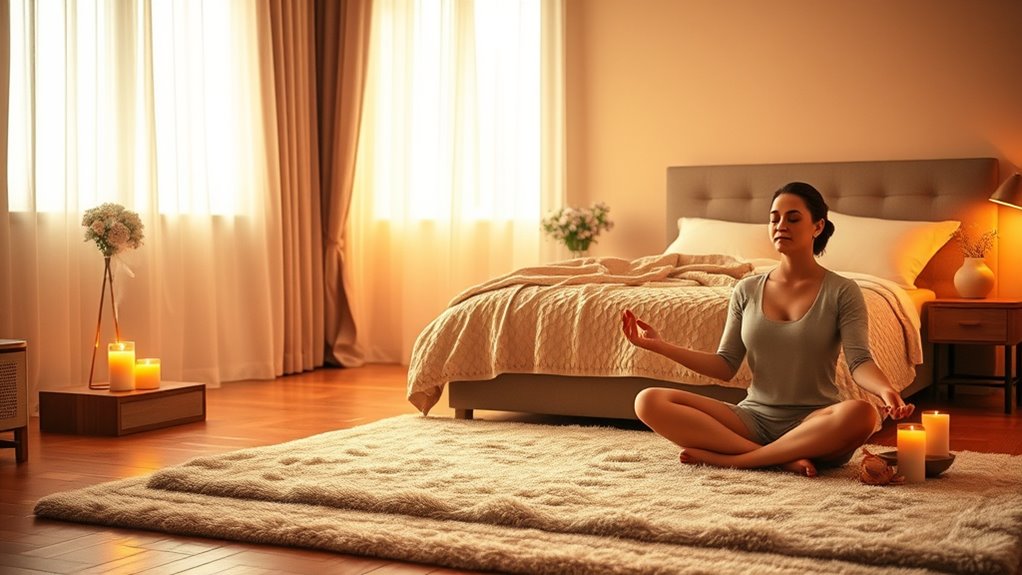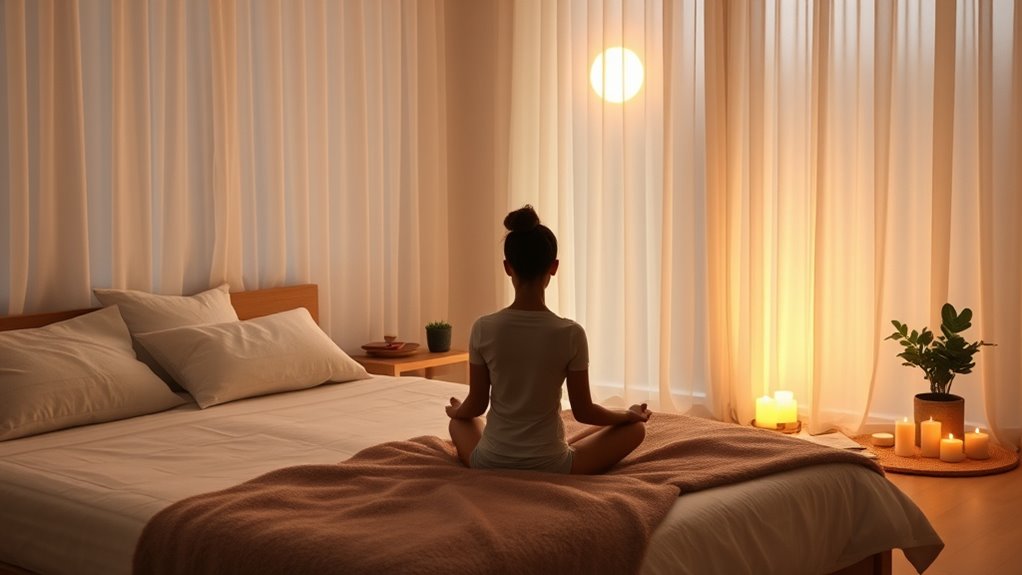To improve your sleep quality, stick to a consistent schedule by going to bed and waking up at the same times daily. Create a calming pre-sleep routine, like relaxing activities or mindfulness, and make your bedroom cool, dark, and quiet. Limit screen time and caffeine before bed, and avoid alcohol close to bedtime. Staying active during the day and managing stress can also make a big difference—if you keep exploring, you’ll discover even more ways to sleep better.
Key Takeaways
- Establish a consistent sleep schedule and create a cool, dark, and quiet sleep environment.
- Develop relaxing pre-sleep routines like reading, meditation, or gentle music.
- Limit caffeine, alcohol, and screen time before bed to reduce stimulation.
- Engage in regular physical activity and practice stress management techniques.
- Use sleep tracking tools and monitor habits to identify and address disruptions.
Establish a Consistent Sleep Schedule

Establishing a consistent sleep schedule is one of the most effective ways to improve your sleep quality. When you go to bed and wake up at the same times daily, you help regulate your sleep cycle, making it easier to fall asleep and wake refreshed. Good sleep hygiene involves maintaining these routines, which reinforce your body’s internal clock. Irregular sleep patterns disrupt your natural sleep rhythm, leading to poorer sleep quality and daytime fatigue. To optimize your sleep, choose a bedtime that allows for enough rest and stick to it—even on weekends. Over time, this consistency helps your body anticipate sleep, reducing tossing and turning. Additionally, maintaining a stable sleep environment can further support your body’s circadian rhythm. Incorporating sleep hygiene practices such as limiting screen time before bed can also significantly enhance sleep quality. Ensuring your sleep environment is comfortable and free from disturbances can make it easier to fall asleep and stay asleep throughout the night. Creating a consistent routine around bedtime activities can also help signal to your body that it’s time to wind down and prepare for sleep. Ultimately, a steady schedule enhances your overall sleep hygiene, making restorative sleep more achievable each night.
Create a Calming Bedtime Routine

Creating a calming bedtime routine helps signal your body that it’s time to wind down. You should aim to keep your sleep times consistent and include relaxing activities like reading or taking a warm bath. These habits can make falling asleep easier and improve your overall sleep quality. Incorporating mindfulness practices such as meditation can further enhance relaxation and prepare your mind for restful sleep meditation. Using soundscapes or calming music during your routine can also help create a more soothing environment for sleep. You might also consider using essential oils for relaxation, such as lavender or eucalyptus, to promote a tranquil atmosphere in your sleep environment. Additionally, incorporating gentle herbal remedies like pine honey may support immune health and reduce stress, contributing to better sleep.
Establish Consistent Sleep Times
Since your body thrives on routine, setting a consistent bedtime helps signal to your mind and body that it’s time to wind down. When you go to bed at the same time each night, you make it easier to maintain regular sleep patterns. Sleep monitoring tools can help you track your sleep cycles, revealing patterns and disruptions that impact your rest. Over time, this data allows you to adjust your schedule for better quality sleep. Dream analysis can also provide insight into your sleep quality by highlighting stressors or emotional issues affecting your rest. Additionally, incorporating glycolic acid products into your skincare routine can improve skin texture and radiance, helping you feel more confident and relaxed before bed. Maintaining proper sleep hygiene, such as controlling light exposure before bedtime, further enhances sleep quality. Using sleep environment optimization techniques, like temperature control and noise reduction, can also promote deeper, more restorative sleep. Keeping your circadian rhythm aligned with natural light cycles supports your sleep-wake pattern and overall health. By establishing a consistent sleep time, you create a stable rhythm that promotes relaxation, improves sleep efficiency, and helps you wake feeling more refreshed each morning.
Incorporate Relaxing Activities
To improve your sleep quality, incorporating relaxing activities into your bedtime routine can make a significant difference. Engaging in calming practices helps signal your body that it’s time to wind down. Meditation practices are excellent for reducing stress and quieting your mind before sleep. Aromatherapy benefits, such as diffusing lavender or chamomile, can create a soothing environment that promotes relaxation. You might also consider gentle stretching or reading a book to ease tension. Establishing these habits regularly helps train your body to associate certain activities with sleep, making it easier to fall asleep faster. Practicing heartfelt bedtime rituals can also enhance your awareness of subconscious messages, improving overall sleep quality. Additionally, understanding the importance of local ingredients in promoting healthy habits can support your efforts in creating a restful environment. Incorporating sleep-friendly foods into your evening meals can further support relaxation and better sleep. Using eye patches as part of your nighttime routine can also help reduce puffiness and dark circles, contributing to a more refreshed appearance upon waking. By consistently incorporating these relaxing activities, you’ll improve your sleep quality and wake feeling more refreshed.
Optimize Your Sleeping Environment

A comfortable, quiet, and dark sleeping environment is essential for improving sleep quality. Start by controlling your lighting—use blackout curtains or a sleep mask to block out unwanted light, which can interfere with melatonin production. Adjust lighting levels in your bedroom to create a calm, relaxing atmosphere before bed. Equally important is mattress comfort; ensure your mattress provides proper support and feels comfortable to avoid tossing and turning. Replace old or unsupportive mattresses if needed. Keep your bedroom cool, ideally between 60-67°F, to promote better sleep. Minimize noise disruptions by using earplugs or white noise machines. Incorporating air purifier features and technology can help monitor and optimize your sleep environment for better rest. Modern air purifiers equipped with air quality sensors can detect pollutants and adjust filtration levels automatically, creating a healthier sleeping space. Additionally, understanding the significance of sleep hygiene practices can further enhance your ability to fall asleep and stay asleep throughout the night. A well-optimized sleep environment helps your body relax and signals that it’s time to rest, leading to more restorative sleep. Additionally, paying attention to angel numbers and spiritual signs can create a calming mental space that promotes restful sleep.
Limit Exposure to Screens Before Bed

Limiting your exposure to screens before bed is essential for improving sleep quality because the blue light emitted by digital devices can suppress melatonin production. When you use phones, tablets, or computers late at night, your body struggles to recognize it’s time to wind down, making falling asleep harder. To minimize this effect, consider the following:
- Switch to physical books or magazines instead of e-books.
- Use blue light filters or night mode settings on your devices.
- Set a device curfew at least 30-60 minutes before bedtime.
- Keep digital devices out of your bedroom or turn them off completely.
Reducing screen time helps your natural sleep cycle stay intact, allowing you to fall asleep faster and enjoy deeper rest.
Watch Your Caffeine and Alcohol Intake

Consuming caffeine and alcohol too close to bedtime can considerably disrupt your sleep quality. Caffeine consumption, even in small amounts, can stay in your system for hours, making it harder to fall asleep and reducing sleep deepness. To improve your sleep, limit caffeine intake after mid-afternoon. Alcohol may initially make you feel sleepy, but it often leads to fragmented sleep and frequent awakenings later in the night. Practicing alcohol moderation is essential; avoid drinking large quantities close to bedtime. By managing your caffeine consumption and practicing alcohol moderation, you support your body’s natural sleep cycle. These simple adjustments can help you fall asleep faster, stay asleep longer, and wake up feeling more refreshed. Additionally, choosing dog names that reflect your lifestyle or personality can promote overall well-being and happiness, which can indirectly improve sleep quality.
Incorporate Relaxation Techniques

Incorporating relaxation techniques into your nightly routine can substantially improve your sleep quality. Techniques like breathing exercises and meditation help calm your mind and relax your body, making it easier to drift off. For example, deep breathing slows your heart rate and reduces stress, while meditation techniques focus your attention and clear mental clutter. You might try:
- Practicing slow, deep breaths for 5-10 minutes before bed
- Using guided meditation apps to focus your thoughts
- Engaging in progressive muscle relaxation to release tension
- Incorporating mindfulness meditation to center your mind
These methods signal to your body that it’s time to wind down, helping you fall asleep faster and enjoy more restful sleep throughout the night.
Stay Active During the Day

Staying active during the day can considerably enhance your sleep quality by helping to regulate your body’s internal clock and reduce stress levels. Incorporate regular exercise routines, such as brisk walks, cycling, or swimming, to boost your energy expenditure and promote better rest at night. Outdoor activities are especially effective because they expose you to natural light, which helps synchronize your circadian rhythm. Aim to be active for at least 30 minutes most days, ideally earlier in the day, so your body has time to wind down later. Staying consistent with your activity levels not only improves sleep but also increases overall health and mood. Remember, staying active is a key step in establishing a sleep-friendly routine.
Manage Stress and Practice Mindfulness

Managing stress and practicing mindfulness can considerably improve your sleep by calming your mind and reducing anxiety that often keeps you awake. Incorporating mindfulness meditation into your daily routine helps you stay present and manage racing thoughts, promoting relaxation. To enhance stress reduction, consider these strategies:
Managing stress through mindfulness and relaxation techniques can lead to better sleep and a calmer mind.
- Engage in deep breathing exercises before bed
- Practice mindfulness meditation daily to lower anxiety
- Keep a journal to unload worries and clear your mind
- Limit screen time an hour before sleeping to reduce stimulation
Frequently Asked Questions
How Long Should I Aim to Sleep Each Night for Optimal Health?
You should aim for 7 to 9 hours of sleep each night for ideal health. Your sleep duration directly impacts your energy, mood, and immune function. To achieve this, establish restful routines like consistent bedtimes and limiting screen time before bed. Prioritizing quality sleep helps your body recover and stay alert, making it easier to handle daily stresses and maintain overall well-being.
Can Certain Foods Improve or Hinder My Sleep Quality?
Certain foods can definitely impact your sleep quality. For better rest, focus on diet and digestion by choosing sleep-friendly options like nuts, cherries, and whole grains. Avoid heavy, spicy, or sugary foods close to bedtime, as they hinder sleep. Nutritional timing matters too—try to eat dinner at least a few hours before sleep to give your digestion time to settle, helping you fall asleep faster and enjoy deeper sleep.
What Are the Signs of Sleep Disorders I Should Watch For?
You should watch for signs like loud snoring, gasping, or choking during sleep, which may indicate sleep apnea. Also, notice if you experience restless legs, making it hard to stay still at night. Excessive daytime sleepiness, unrefreshing sleep, or frequent awakenings are warning signs. If you notice these, consider consulting a healthcare professional to evaluate for sleep disorders and get proper treatment.
How Does Sleep Quality Affect Mental Health and Cognitive Function?
Imagine waking up refreshed, ready to tackle your day—good sleep quality makes this possible. It directly influences your mental health, reducing anxiety and depression, and sharpens cognitive function, improving memory and focus. When your sleep is disrupted, you might notice mood swings and difficulty concentrating. Prioritizing restful sleep helps maintain emotional balance and mental clarity, enabling you to perform better and feel more resilient throughout your day.
Are There Specific Mattress or Pillow Types That Enhance Sleep?
You might find that choosing a mattress with the right firmness, like medium or adjustable, helps you sleep more comfortably. Additionally, selecting a pillow made from supportive materials such as memory foam or latex can reduce neck strain. These options keep your spine aligned and your head supported, promoting better sleep quality. Experimenting with different mattress firmness and pillow materials allows you to find what works best for your sleep needs.
Conclusion
Think of your sleep routine as a garden—you need to tend to it daily for it to flourish. By establishing consistent habits, creating a calming environment, and managing stress, you can cultivate better sleep. Small changes are like watering your garden—they may seem simple, but over time, they help your sleep bloom beautifully. Prioritize these habits, and you’ll enjoy nights of restful, rejuvenating sleep, allowing you to face each day with fresh energy and clarity.










